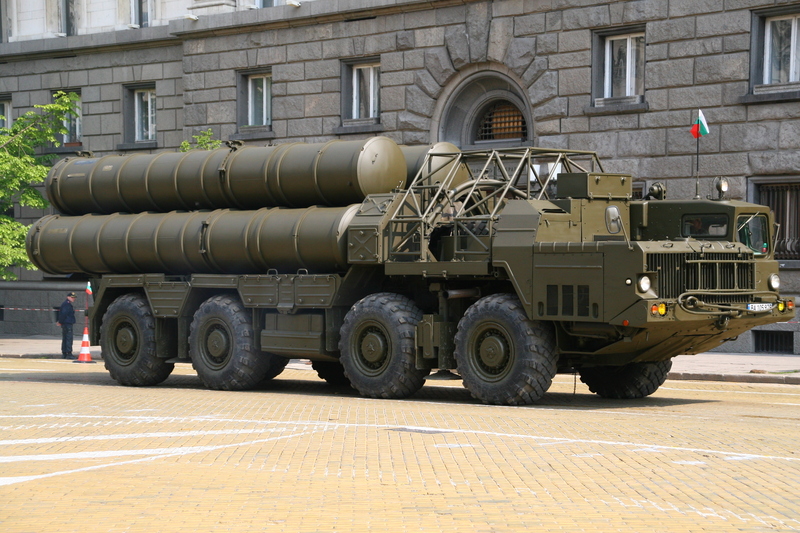by Mark N. Katz
There have been numerous reports about how Israeli Prime Minister Benjamin Netanyahu recently called Russian President Vladimir Putin to express Israeli displeasure with Moscow ending its embargo on the sale of Russian S-300 air defense missile systems to Iran. Putin reportedly responded by telling Netanyahu that these missiles are “purely defensive” and so “pose no threat to Israel.”
Convinced that Iran intends to acquire nuclear weapons even if it formally agrees not to, Netanyahu has long objected to the prospect of Russia selling S-300s to Iran. For although Moscow describes these weapons as “purely defensive,” worst-case analysts in Israel fear that Iranian possession of a robust air defense missile system would allow Tehran to believe it could build a nuclear weapons capacity that could survive an Israeli or even American attack. And even if Iran had no intention of launching a nuclear attack, possession of a survivable nuclear weapons capacity—Israelis fear—would lead Iran to behave even more aggressively in the Middle East than it does now. Further several Arab states (especially in the Gulf region) share these concerns about the prospect of a nuclear-armed Iran
The Russian decision to end its embargo on shipping S-300s to Iran appears to mark an important change in Russian-Israeli relations. Under Putin, Russian-Israeli relations have been close. In addition to a growing trade relationship, Russia and Israel cooperate in the security realm. Israel has also become one of the few sources for Moscow of Western military technology, particularly unarmed aerial vehicles (UAVs).
Russia and Israel, though, have not always seen eye-to-eye on several issues, including Iran, Syria, and Georgia. As Russian-Georgian relations were deteriorating during 2008, Israel was providing military assistance to the Saakashvili government in Tbilisi. But Israel stopped doing so, apparently at Moscow’s behest, at the time of the outbreak of the Russian-Georgian war in August of that year. “The Russians noted that they periodically accede to Israeli requests not to provide weapon systems to countries that threaten Israel,” Nadav Ze’evi noted in Ma’ariv in August 2008.
Press accounts (as well as knowledgeable Russians I have spoken to) have mentioned since then that, according to a Russian-Israeli “understanding,” Russia would not ship S-300s to Iran, even though Moscow had signed an agreement with Tehran to do so. As recently as January 19, 2015, the Moscow Times quoted Ruslan Pukhov (director of the Moscow-based Center for the Analysis of Strategies and Technologies, and a member of the Russian Defense Ministry’s Public Advisory Board) as saying that “Russia has a secret obligation to Israel not to deliver S-300s to either Iran or Syria.”
Assuming reports of this Russian-Israeli understanding are true, why would Putin decide to renege on it now? Or did he?
One explanation of how Putin might be trying to “have his cake and eat it too” on this issue is that some versions of the S-300 are more capable than others. If Putin made clear to the Israelis that he will ship a less capable version to Tehran, then his statement that Russian S-300s in Iran “pose no threat to Israel” may in fact succeed in reassuring Netanyahu.
Pukhov offered another possible explanation. “The Israelis almost tacitly supported Putin in Ukraine and he won’t sacrifice [the relationship] for a handful of dollars,” the Moscow Times quoted him as saying on April 14. “As long as Netanyahu is in power…Russia will not be delivering S-300s to Iran.”
If Moscow goes ahead and ships S-300s to Tehran, Pukhov will be proved wrong. But if he is right, then this would be consistent with Tehran’s previous experience with Moscow reneging on Russian agreements to sell arms to Iran first as a result of the “secret” Gore-Chernomyrdin agreement in 1995 and then Medvedev’s 2010 freezing of the original agreement for Russia to sell S-300s to the Islamic Republic.
Yet even if Moscow does provide advanced S-300s to Iran, Netanyahu and Putin may still not be working at cross purposes. They both may believe they will benefit if the resumption of the S-300 transfers to Iran hinders the prospects for an Iranian nuclear agreement that both fear would lead to an Iranian-American rapprochement, which Putin worries would lead to greater American influence in the region and Netanyahu worries would lead to greater Iranian influence in Washington.






Israel is hedging its bet since the days of Anerica out in the future don’t look rosy,stable,or promising. It is natural that it would keep other powers happy.
Actually Israel is a charter member of the IAEA.